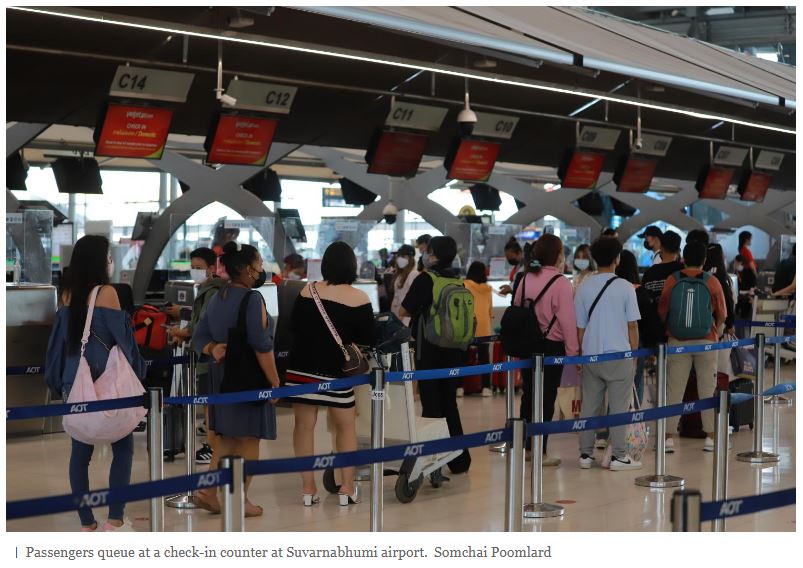Thailand: Tour operators jittery despite easing restrictions
Outbound travel has shown early signs of a rebound as restrictions ease across the globe, yet tour operators expect many challenges from ongoing viral outbreaks and economic woes.
Charoen Wangananont, president of the Thai Travel Agents Association (TTAA), said outbound tourism was just about to restart when it was disrupted by a spike of infections from the new subvariants in popular markets like Japan and Korea.
The new wave might slow down full reopening in those countries, especially Japan.
Outbound travel to Europe also faced hurdles from time-consuming visa process which took months.
The TTAA plans to meet related agencies such as the Foreign Ministry as well as embassies to find a solution to this issue.
He said operational costs for outbound operations increased by 30-40% on average from Covid-related expenses, airfares and the higher cost of living which directly impacted travel budgets and frequency for the middle- and low-income segments.
“Tour operators continue to suffer from rising costs despite improvement in travel sentiment. We could maintain or slash our margins to attract tourists,” Mr Charoen said.
The association has over 900 tour firms, of which 90% already restarted, but most of them cannot fully operate as seen before the outbreak.
SLOW RECOVERY
Tour operators were hopeful about strong business until the Omicron variant emerged in last October, followed by the delayed reopening of Asian countries and the possibility of a new wave, said Thanapol Cheewarattanaporn, TTAA vice-president.
Although the number of outbound trips gradually increased, demand is still inconsistent.
Most workers in the tour industry will not come back due to the lack of confidence.
Somchai Chomraka, chairman of Weekend Tours, said Thais start to book overseas trips in the past few months, but the volume remains lower than pre-Covid levels as some restrictions remained in Japan.
Airfares for group reservations also faced higher prices of around 5,000-6,000 baht for destinations in Europe.
He said the price for short-haul destinations was also 1,000-2,000 baht more expensive.
Outbound travel currently seems to be picking up as tourists their remaining credit with tour firms, but operators have to wait until October to see the real flow of new demand, said Jitakorn Wijannarong, president of the Tour Operator Network Association.
Mr Jitakorn said wholesalers have to set practical and standard prices for tour packages and incentive programmes in order to educate tourists to shift focus from the cheap services to more reliable quality.
The TTAA will hold a meeting with wholesalers and retailers to discuss pricing standards, including travel insurance, to ensure the high quality of products.
INTRA-REGION OPPORTUNITY
Southeast Asia is among key destinations that the association will promote and create partnerships with the national tourist organisation in each country to exchange the flow of tourists.
Mr Charoen said potential countries including Laos and Vietnam have new tourism products, while Malaysia has developed into a major tourism market.
Trips to nearby countries mostly offer hassle-free travel with an affordable budget, and are also a good way for operators to reduce operational risks and control costs.
He said operators offer more packages to neighbouring countries to diversify products and avoid a red ocean market in destinations like Japan and South Korea.
“As Southeast Asia has a population of over 600 million, generating intra-region tourism will help us sustain business as we don’t have to rely solely on long-haul markets, particularly if any crisis hits in the future,” Mr Charoen said.
Moreover, a joint network between the TTAA and the Association of Domestic Travel plans to update tour operators about new products via familiarisation trips and business matching to support recovery from two-way tourism.
Source: https://www.bangkokpost.com/business/2353236/tour-operators-jittery-despite-easing-restrictions


 Thailand
Thailand




